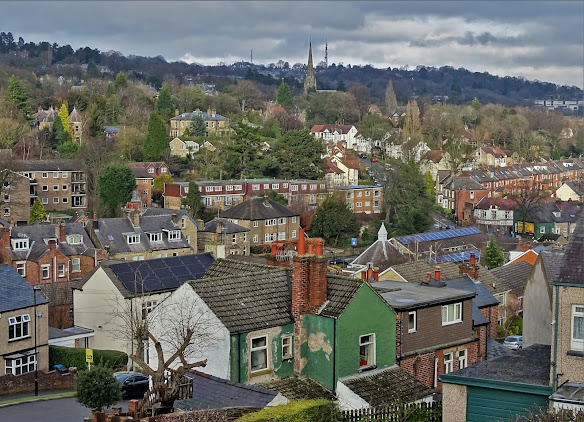Back in May 2017, I wrote about holiday jobs I had during my years at university. Go here. I referred to Butlin's - a famous holiday camp chain that bloomed in Britain in the years following World War II. Butlin's is still with us but in a reduced and altered form. It's nothing like the old days.
There were large Butlin's holiday camps at Skegness (Lincolnshire), Minehead (Somerset), Bognor Regis (Sussex), Ayr (Scotland) Pwllheli and Barry Island (Wales), Clacton (Essex) and Filey (Yorkshire). I worked at the last one in the summer of 1975.
These camps were self-contained. Families slept there, ate there, drank there and took advantage of the various entertainment possibilities that Butlin's provided. As all the camps were in seaside locations guests could also wander down to beaches that were fenced off for exclusive use by Butlin's visitors. One might ask if the fences were to keep strangers out or to keep holidaymakers inside the places. Entering a Butlin's holiday camp was rather like entering a military base - such was the security.
By the early sixties working class people at last had disposable incomes to play with - unlike their parents and grandparents who invariably lived from hand to mouth. Money in your pocket meant you could just about afford to take your family away for a week in a holiday camp and you did not have to plan your holiday very much because Butlin's did it all for you. It was easy - perhaps like the regimentation of wartime.
In my weeks at Filey, I slept in a two person chalet in the downmarket accommodation zone tolerated by the staff. It was like a refugee camp somewhere in The Middle East. I was twenty two and I was put with an Irish fellow ten years my senior. He was called Ben and not someone I would naturally have chosen as a roommate.
Though in general I am fond of the Irish people, Ben was hard to like. He was tough and rough with horrible tattoos down both arms and he happily confessed that he had spent time in prison. He spoke English with a very broad Kilkenny accent and careless enunciation. You would not want to get on the wrong side of a bloke like that so I jollied him along. He probably thought that I was a posh English twerp because I read books, used some big words and went to university.
Most nights Ben went to the staff bar and stumbled back into our little chalet room around midnight - waking me up. I was working fourteen hours a day to maximise my income and I was not interested in the staff bar, I just wanted to get to sleep ready for the next day.
One particular night is ingrained in my memory. Ben stumbled back into the room in the early hours with a companion - a cleaner he had hooked up with the previous summer. She was called Judy and she came from Leeds. She would not have won any kind of prize in a Butlin's Bathing Beauty competition but she was nice enough. As usual, I had to pretend I was asleep as they blundered around.
Soon the electric light was off and they were both in Ben's single bed. Ben was grunting like a wild boar and the bed springs had a squeaky musical rhythm. Judy was panting like a marathon runner. Yes you guessed it - they were making love as I lay no more than six feet away. Judy said "Oo! Ben!" and Ben kept grunting. I wanted to get up and complain vociferously, "I say old chap this is just not on! Can't a fellow get a decent night's kip without the noise of two animals coupling?" But of course, I just kept quiet. Ben had that effect on me.
After ten minutes the romantic act was over and all went quiet. What a relief! For me as well as them. Perhaps I could get back to sleep again.
Then Ben said quietly at first, "You've wet my bed!" The same declaration was made three or four times rising in volume. Pathetically, Judy protested, "It weren't just me Ben, it were you and all."
"You've wet my ****ing bed!" Ben yelled at full volume, consumed by anger.
The light went back on and there was a naked Ben and a naked Judy. I peeped through my eyelashes briefly to confirm this.
Ben did not hit Judy but he handled her roughly and chucked her out of the chalet followed by her clothes and shoes still yelling, "You wet my ****ing bed!" as Judy sobbed, "I'm going to get security on you Ben you bastard!"
"**** off!" he yelled slamming the door in her face.
Shakespeare was right when he said that the course of young love never does run smooth. Ben flipped his mattress over and was soon sound asleep snoring like a grizzly bear in a cave. The next day he forgot to say to me, "I am sorry that I disturbed you last night!" But that was Ben for you - shy to the end.
After all these years, I am glad that I have at last recorded that nocturnal incident in writing. Looking back, it was all part of life's rich tapestry...
An early badge from Filey








































